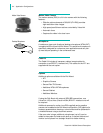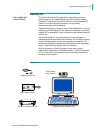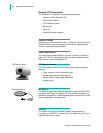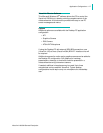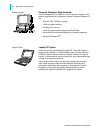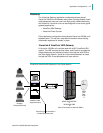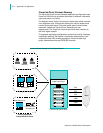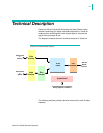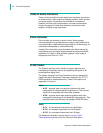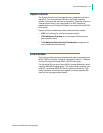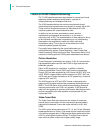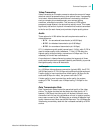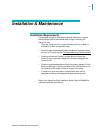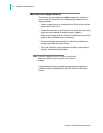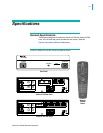
3-2 Technical Description
VisuaLink 128/384 General Description
Video & Audio Interfaces
These circuits provide the correct electrical and protocol connections
for video sources, video outputs and display monitors, audio sources,
and audio outputs. Connections are provided for microphones,
headset, line-level audio inputs/outputs, and video inputs/outputs.
VisuaLink supports S-video which allows the transmission and
reception of higher image resolutions.
Echo Canceller
Echo can be a real problem on audio circuits. Some systems
communicating over long distances can create an echo effect that is
very distracting for videoconferencing participants. So distracting, it is
considered unacceptable in videoconferencing.
A special Echo Canceller circuit eliminates echo effects caused by
long distance lines and signal clipping caused by narrow bandwidth
equipment. This built-in echo canceller supports a wide range of
frequencies from 50 Hz to 7 KHz.
H.320 Codec
The Codec is the heart of the VisuaLink system; digitizing and
compressing video/audio signals, and preparing the signals to be
transmitted over digital lines.
The Codec, along with the Echo Canceller circuits are designed to
support the latest International Telecommunications Union (ITU-T)
H.320 standard for videoconferencing. These H.320 options are
supported in VisuaLink:
Video:
•
H.261
- supports older low resolution systems with video
compression for wide bandwidth transmissions. (This ensures
VisuaLink is compatible with these older systems.)
•
H.263
- supports newer high resolution systems with video
compression technology for low bandwidth transmissions. (This
provides better picture quality over standard ISDN BRI lines.)
Audio:
•
G.711
- for narrowband transmission (at 48-56 Kbps)
•
G.722
- for wideband transmission (at 48-56 Kbps)
•
G.728
- for narrowband transmission (at 16 Kbps)
(For additional information, see the section
more on H.320
Videoconferencing
at the end of this
Technical Description
.)



